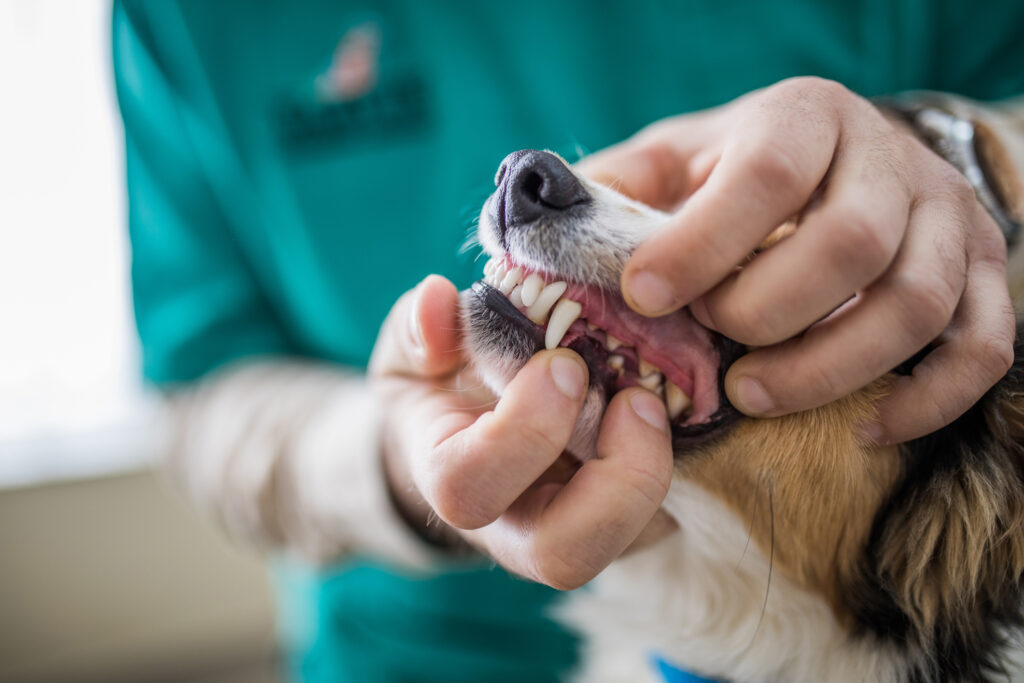Dog Tooth Abscesses: Causes and Treatment
No pet owner is ever happy to find out that their dog has developed dental problems, especially when that dental issue is a tooth root abscess. So what causes tooth abscesses in dogs and how are they treated?
Most of the time tooth abscesses in dogs are caused by prolonged poor oral hygiene. This usually occurs after dental disease has been going on in the mouth for some time. Sometimes dogs will also get a tooth abscess after a broken or cracked tooth. Luckily, tooth abscesses in dogs can be treated by a vet.
In this article, we will be explaining everything that dog owners need to know about tooth abscesses in dogs. We will go over how tooth abscesses occur, are diagnosed, and are treated by a vet. Additionally, we will be answering some other commonly asked questions about tooth abscesses in dogs by dog owners. Let’s jump right in.
What is a Tooth Abscess?
An abscess is a pocket of pus. In tooth abscesses, this pocket is located at the root of the tooth. This usually does not only infect the tooth with bacteria, but also the gums and other tissue surrounding that tooth. If left untreated, this bacterial infection could spread causing more pain and potential complications.
What Causes Tooth Abscesses in Dogs?
Most of the time dogs will get tooth abscesses after getting a fractured, cracked, or broken tooth. The preexistence of dental disease puts a dog at greater risk of developing a tooth abscess after getting a fractured tooth. Sometimes dogs with very severe dental disease can develop tooth abscesses even without having a tooth fracture.
Tooth abscesses are most common around the molars because these are the teeth that dogs use to chew very hard objects like bones and chew toys. Extreme chewers can sometimes fracture their molars on these items when not careful.

What are the Symptoms of a Tooth Abscess in Dogs?
There are many symptoms associated with tooth abscesses in dogs. Here are the most common symptoms of tooth abscesses in dogs for dog owners to look out for.
- Foul smelling breath
- Excessive drooling
- A reduced appetite
- Fever
- Showing signs of pain (especially when eating, picking things up in their mouth, and biting on toys)
- No longer playing with toys like they used to
- Showing signs of having difficulty eating (favoring one side of the mouth, eating gingerly, etc.)
- Pawing or scratching at their mouth
- Swelling around the mouth and face
- Red and swollen gums
- The presence of pus or blood in the mouth
If you notice any of these symptoms in your dog then it is best to take them to the vet as soon as possible. This way they can get officially diagnosed and properly treated before the infection gets worse.
How are Tooth Abscesses in Dogs Diagnosed?
Vets will officially diagnose a tooth abscess after taking an X-Ray of the mouth. This X-Ray will show the pocket of pus and the infection within the tooth. Of course, your vet should also give your dog a physical examination and take their medical history as well.
How are Tooth Abscesses in Dogs Treated?
Most of the time the abscess and infected tooth will need to be physically removed in order to be treated properly. This is done while the dog is under anesthesia so that they do not experience any fear or pain.
In some cases, the tooth can be saved with a root canal. However, this is a more expensive option, and it may not be possible for severe tooth infections. In both treatment plans, antibiotics may be prescribed to help your dog’s body fight the bacterial infection. The abscess will always be drained as well.
After treatment, most dogs will need to eat softened food for about one week after the procedure. This will help keep them comfortable when eating and prevent them from messing with any stitches or wounds from surgery.
How Much Does Tooth Abscess Treatment for Dogs Cost?
Generally speaking, the treatment for tooth abscesses in dogs can cost anywhere between a few hundred dollars to a few thousand in the US. Root canals tend to be much more expensive than extraction.
Is a Dog Tooth Abscess an Emergency?
Yes, tooth abscesses in dogs can be considered an emergency. While a dog tooth abscess does not necessarily need immediate treatment to save a dog’s life, tooth abscesses are still a serious condition that requires treatment as soon as possible. So if you discover an abscess, a visit to the vet as soon as possible is important.
What Happens if a Dog Tooth Abscess Goes Untreated?
If a tooth abscess is left untreated the condition usually progresses and gets worse. This puts your dog in further pain and usually negatively impacts more tissue in the mouth. Severe infections like this in the mouth can also become systemic when left untreated. Systemic infections are life threatening in dogs, and they need to be treated immediately by an emergency vet.
Will a Dog Tooth Abscess Burst on its Own?
Yes, a dog’s tooth abscess could potentially burst on its own. This is a sign that the abscess is severe. As a result, you should take your dog to the vet for treatment immediately if their tooth abscess bursts on its own.
If a dog’s tooth abscess burst pus will drain from the abscess. This is usually pretty painful to dogs when it occurs. It may also put your dog at greater risk of the infection spreading or getting worse.
How Long Can a Dog go With a Tooth Abscess?
The answer to this question varies greatly from case to case. As a result, it is always best to contact your vet as soon as you suspect that your dog may have a tooth infection. This way they can get you in for an appointment as soon as possible.
Can You Treat a Dog’s Tooth Abscess at Home?
No, dog tooth abscesses should not be treated at home. They require veterinary treatment, and oftentimes oral surgery is even required for proper and thorough treatment.
If your dog is in need of a dental cleaning or exam in the Boulder, CO region, then Boulder Veterinary Hospital is here to help! Our expert veterinarians can look at your dog’s teeth and diagnose any issues they may have. Give us a call today at (303) 442-6262, or Request an Appointment online.




